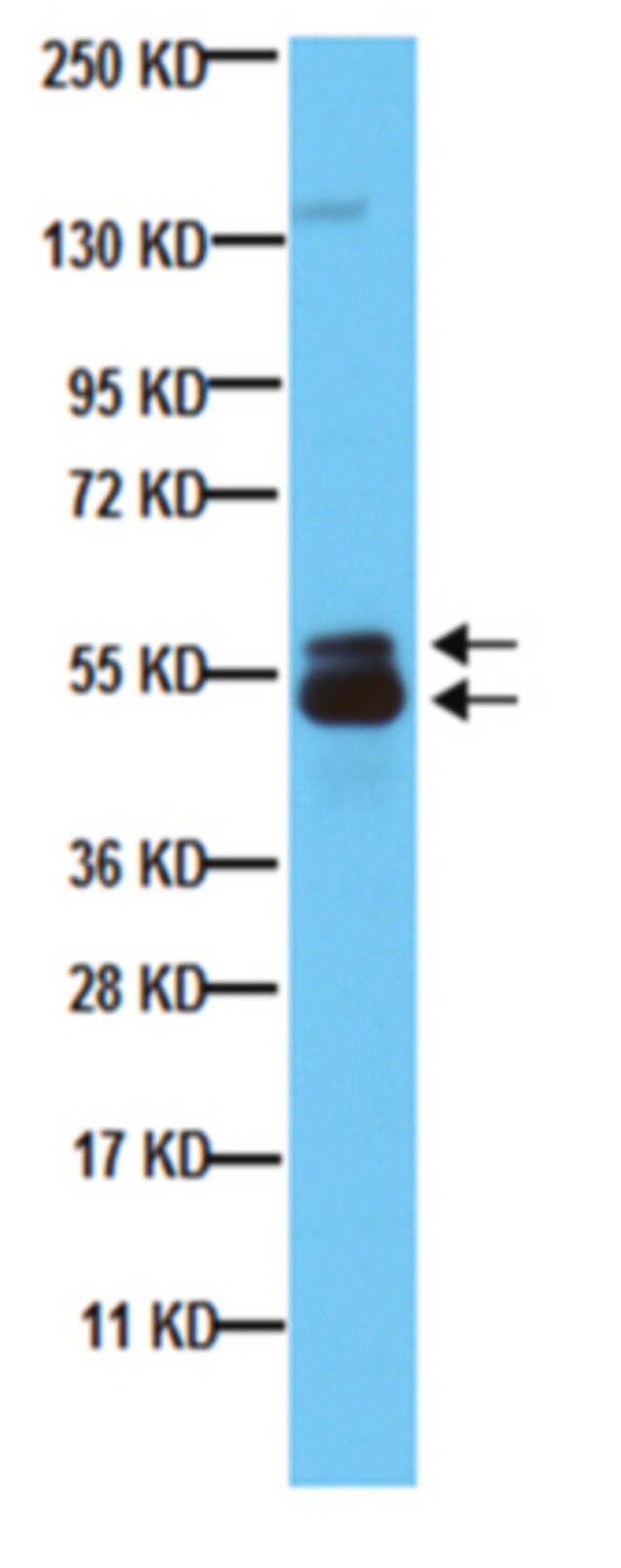您的位置:首页 > 产品中心 > Anti-Microphthalmia (Mi) Antibody, clone C5
Anti-Microphthalmia (Mi) Antibody, clone C5

产品别名
Anti-Microphthalmia (Mi) Antibody, clone C5
Microphthalmia-associated transcription factor, Class E basic helix-loop-helix protein 32, bHLHe32
基本信息
| eCl@ss | 32160702 |
| NACRES | NA.41 |
| General description【一般描述】 | MiTF (Microphthalmia associated transcription factor) is a basic helix loop helix leucine zipper (b HLH ZIP) transcription factor implicated in pigmentation, mast cells and bone development. Mutations in MiTF cause auditory pigmentary syndromes, such as Waardenburg syndrome type II, type IIa and Tietz syndrome in humans. There are two known isoforms of MiTF differing by 66 amino acids at the NH2 terminus. Shorter forms are expressed in melanocytes and run as two bands at 52 kDa and 56 kDa, while the longer Mi form runs as a cluster of bands at 60-70 kDa in osteoclasts and in B16 melonoma cells (but not other melanoma cell lines), as well as mast cells and heart. MiTF plays a critical role in the differentiation of various cell types as neural crest-derived melanocytes, mast cells, osteoclasts and optic cup-derived retinal pigment epithelium. Mi is a basic helix-loop-helix-leucine zipper (b-HLH-ZIP) transcription factor implicated in pigmentation, mast cells and bone development. The mutation of Mi causes Waardenburg Syndrome type II in humans. In mice, a profound loss of pigmented cells in the skin eye and inner ear results, as well as osteopetrosis and defects in natural killer and mast cells. These melanocyte isoforms have been shown by two dimensional tryptic mapping to differ in c-Kit-induced phosphorylation. Osteopetrotic rat strain harbors a large genomic deletion encompassing the 3′ half of Mi including most of the b-HLH-ZIP region. Osteoclasts from these animals lack Mi protein in contrast to wild-type rat, mouse, and human osteoclasts. |
| Specificity【特异性】 | In Western blotting, it recognizes a doublet of 52-56 kDa, identified as serine-phosphorylated and unphosphorylated forms of melanocytic isoforms of microphthalmia (Mi). There are two known isoforms of Mi differing by 66 amino acids at the NH2 terminus. Shorter forms are expressed in melanocytes and run as two bands at 52 kDa and 56 kDa, while the longer Mi form runs as a cluster of bands at 60-70 kDa in osteoclasts and in B16 melonoma cells (but not other melanoma cell lines), as well as mast cells andheart. It reacts with both melanocytic as well as the nonmelanocytic isoforms of Mi. This Ab does not cross-react with other b-HLH-ZIP factors by DNA mobility shift assay. |
| Immunogen【免疫原】 | Recombinant N-terminal fragment of human microphthalmia protein. |
| Application【应用】 | Use Anti-Microphthalmia (Mi), clone C5 mouse monoclonal antibody validated in Electrophoretic Mobility Shift Assay (EMSA), Immunocytochemistry, Immunohistochemistry, Immunoprecipitation and Western blotting for the detection of Microphthalmia-associated transcription factor. Immunohistochemistry Analysis: A representative lot detected microphthalmia immunoreactivity in formalin-fixed, paraffin-embedded human metastatic melanoma tissue sections by fluorescent immunohistochemistry (Feige, E., et. al. (2011). Proc. Natl .Acad. Sci. U. S. A. 108(43):E924-E933). Immunocytochemistry Analysis: A representative lot detected the exogenously expressed murine microphthalmia mutant constructs, Mitf D222/236N and Mitf D222N (mi-vit), in the nucleus of transfected COS-7 cells. Dual staining showed much reduced β-catenin-anchoring ability of these mutants in the nucleus (Schepsky, A., et al. (2006). Mol. Cell. Biol. 26(23): 8914-8927). Immunocytochemistry Analysis: A representative lot detected a time-dependent induction of microphthalmia upregulation in B16/F10 murine melanoma cells upon Forskolin stimulation by fluorescent immunocytochemistry (Bertolotto, C., et al. (1998). J. Cell Biol. 142(3):827-835). Electrophoretic Mobility Shift Assay (EMSA): A representative lot caused a supershift of Mbox motif oligonucleotide-complexed wild-type and D222/236N and D222N mutant murine microphthalmia constructs by EMSA (Schepsky, A., et al. (2006). Mol. Cell. Biol. 26(23): 8914-8927). Electrophoretic Mobility Shift Assay (EMSA): A representative lot caused a supershift of Mbox motif oligonucleotide-complexed microphthalmia, but not TFE3-DNA complex by EMSA using in vitro translated microphthalmia and TFE3 or B16/F10 murine melanoma cell nuclear extract (Verastegui, C., et al. (2000). Mol. Endocrinol. 14(3):449-456). Immunoprecipitation Analysis: A representative lot immunoprecipitated microphthalmia from B16/F10 murine melanoma cell nuclear extracts (Verastegui, C., et al. (2000). Mol. Endocrinol. 14(3):449-456). Western Blotting Analysis: A representative lot detected microphthalmia expression in murine splenocytes and B16/F10 murine melanoma cells (Verastegui, C., et al. (2000). Mol. Endocrinol. 14(3):449-456). Western Blotting Analysis: A representative lot detected a time-dependent induction of microphthalmia upregulation in B16/F10 murine melanoma cells and normal human melanocytes upon stimulation by Forskolin or α-melanocyte–stimulating hormone (αMSH) (Bertolotto, C., et al. (1998). J. Cell Biol. 142(3):827-835). |
| Quality【质量】 | Evaluated by Western Blotting in mouse brain tissue lysate. Western Blotting Analysis: An 1:500 dilution of this antibody detected Microphthalmia in 10 µg of mouse brain tissue lysate. |
| Physical form【外形】 | Protein G Purified Format: Purified |
| Analysis Note【分析说明】 | Control Mouse brain tissue lysates |
| Other Notes【其他说明】 | Concentration: Please refer to the Certificate of Analysis for the lot-specific concentration. |
产品性质
| Quality Level【质量水平】 | 100 |
| biological source【生物来源】 | mouse |
| antibody form【抗体形式】 | purified immunoglobulin |
| antibody product type | primary antibodies |
| clone【克隆】 | C5, monoclonal |
| species reactivity | mouse, human |
| species reactivity (predicted by homology) | rat |
| technique(s) | electrophoretic mobility shift assay: suitable immunocytochemistry: suitable immunofluorescence: suitable immunohistochemistry: suitable immunoprecipitation (IP): suitable western blot: suitable |
| isotype【同位素/亚型】 | IgG2aκ |
| NCBI accession no.【NCBI登记号】 | NP_000239 |
| UniProt accession no.【UniProt登记号】 | O75030 |
| shipped in【运输】 | wet ice |
| Gene Information | human ... MITF(4286) |
产品说明
| Target description【目标描述】 | ~52/56 kDa observed. An uncharacterized band appears at ~140 kDa in some lysates. |
| 【免责声明】 | Unless otherwise stated in our catalog or other company documentation accompanying the product(s), our products are intended for research use only and are not to be used for any other purpose, which includes but is not limited to, unauthorized commercial uses, in vitro diagnostic uses, ex vivo or in vivo therapeutic uses or any type of consumption or application to humans or animals. |
安全信息
| Storage Class Code【储存分类代码】 | 12 - Non Combustible Liquids |
| WGK | WGK 1 |




